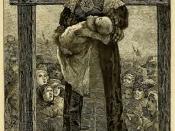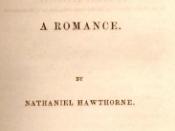Nathaniel Hawthorne's background influenced him to write the bold novel "The Scarlet Letter". One important influence on the story is money. Hawthorne had never made much money as an author and the birth of his first daughter added to the financial burden ("Biographical Note" VII). He received a job at the Salem Custom House only to lose it three years later and be forced to write again to support his family (IX). Consequently, The Scarlet Letter was published a year later (IX). It was only intended to be a long short story, but the extra money a novel would bring in was needed ("Introduction" XVI).
Hawthorne then wrote an introduction section titled "The Custom House" to extend the length of the book and The Scarlet Letter became a full novel (XVI). In addition to financial worries, another influence on the story is Hawthorne's rejection of his ancestors. His forefathers were strict Puritans, and John Hathorne, his great-great-grandfather, was a judge presiding during the S! alem witch trials ("Biographical Note" VII).
Hawthorne did not condone their acts and actually spent a great deal of his life renouncing the Puritans in general (VII). Similarly, The Scarlet Letter was a literal "soapbox" for Hawthorne to convey to the world that the majority of Puritans were strict and unfeeling. For example, before Hester emerges from the prison she is being scorned by a group of women who feel that she deserves a larger punishment than she actually receives. Instead of only being made to stand on the scaffold and wear the scarlet letter on her chest, they suggest that she have it branded on her forehead or even be put to death (Hawthorne 51). Perhaps the most important influence on the story is the author's interest in the "dark side" ("Introduction" VIII).


